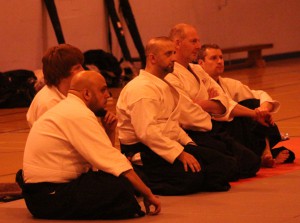Dojo Etiquette
 Aikido follows a system of etiquette, which is a set of guidelines for how to behave when you are in the dojo (practice hall). We observe etiquette for many reasons: to show respect for our partners and teachers, to maintain our dojo, to keep our classes safe and running smoothly, and to help us focus mentally on practice. We consider etiquette an important part of training, so we ask that you begin following these guidelines as soon as you start aikido:
Aikido follows a system of etiquette, which is a set of guidelines for how to behave when you are in the dojo (practice hall). We observe etiquette for many reasons: to show respect for our partners and teachers, to maintain our dojo, to keep our classes safe and running smoothly, and to help us focus mentally on practice. We consider etiquette an important part of training, so we ask that you begin following these guidelines as soon as you start aikido:
Cleanliness
- Come to practice with a clean body and clean gi (uniform). If you don’t have a gi, you can wear loose-fitting clothing (sweats are best). There is a lot of contact in aikido, which is more pleasant when we and our partners are clean. Pay special attention to your hands, which make a lot of contact with your partners, and your feet, which make a lot of contact with the mat.
- To prevent tracking on the mat, please wear zori (sandals or thongs) from the dressing room to the mat. If you don’t have zori, wear shoes. Because our faces touch the mat during practice, it is especially important that we keep the mat clean.
- If possible, do not wear heavy perfume or cologne when practicing. Some people are allergic; others simply don’t like it. Also, do not wear makeup on the mat. If you wear makeup during practice, you will soon find it on the mat and other people.
Safety
- Please take jewelry off before practicing. This includes earrings, necklaces, watches, rings, etc. All foreign objects have the potential of hurting you or someone else.
- Please keep your fingernails and toenails trimmed. Long nails are dangerous, because they can easily cut other people. They have also been known to break or bend backwards.
- Always strive to avoid accidents. When you practice aikido, pay attention to your surroundings so you can avoid colliding with other students. If you or your partner accidentally collides with another student during practice, aknowledge the student and his or her partner and say “excuse me.” Then resolve to pay better attention next time. Even if you did not cause the accident, chances are you could have prevented it.
- When practicing aikido, always take into account you and your partner”s ability and practice at a level that is comfortable for both of you. You need not try to “push” or “force” yourself or your partner to improve any more quickly than you truly can. This said, we are all trying to improve our physical abilities, but our attitude and conduct is also important. Impatience, with another or oneself, can be a distraction from the Path of Peacefulness.
- As much as possible, practice in a steady, smooth manner. Quick, jerky techniques can be unpleasant and possibly dangerous to a beginning student who is not yet able to receive them.
Other Important Points
- If you have a question while a technique is being demonstrated, raise your hand when there is an appropriate pause, and wait until the Sensei acknowledges that you have a question, then ask your question.
- If you have a question while practicing, wait until the Sensei comes to your area of the mat, then sit in seiza, raise your hand, and wait for your question to be acknowledged. Then ask your question.
- If you arrive late for class, you must get the instructor’s permission to practice. To do this, sit in seiza on the edge of the mat. Wait for the instructor to motion you onto the mat. Then join the class.
- If you want to leave the mat, you must first ask permission of the Sensei, even if he/she knows you are leaving early. If you have a physical emergency (bloody nose, nausea, injury, etc.) and need to leave the mat quickly, just leave. When the emergency is over, you can tell the Sensei why you left.
- If your belt or pants loosen during practice, turn away from your practice partner and re-tie your practice clothing. acknowledge your partner to begin practice again.
These are a lot of rules to remember, but they should come naturally to you in time. Keep in mind that etiquette means more than just having good manners, or just a set of rules that restrict, rather than ensuring that class is free from distractions. It means caring for your fellow students, your teachers, and your dojo. In every aspect of your aikido practice, try to show respect, courtesy, and good sense. If you practice with a positive and willing attitude, you will learn quickly. If you have any questions about etiquette or other aspects of aikido practice, please feel free to ask the Sensei or any one wearing a hakama (traditional Japanese pants). We appreciate your interest in aikido.

